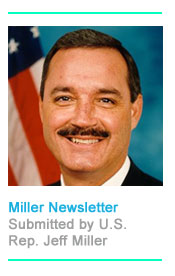Oil Spill: Newsletter From U.S. Rep Jeff Miller
May 16, 2010
Last week, Admiral Thad Allen, Commandant of the Coast Guard, came to our district and met with local officials to hear and address their concerns and discuss actions the Coast Guard is taking. I also joined Admiral Allen on an overflight of the oil spill and spoke with him about my concerns and those of my constituents. The response is a joint effort of several federal agencies, and the Coast Guard is carrying a significant share of the workload toward cleaning up our waters and helping to find a way to stop the oil leak.
 I have continued to push BP to set up an escrow account for all the Gulf states to draw from as they incur not only capital costs from prevention and cleanup but also economic losses from the oil spill. While BP issued block grants of $25 million to each state, we cannot lose sight of the fact of the sheer amount of coastline that Florida has compared to some other states. Preparing our massive coastline for the oil spill will go through that $25 million much faster than some other states. That block grant still does not fully address economic losses already being incurred by small businesses, fishermen, and other individuals along the Gulf Coast. The escrow account I have proposed would not only offset that impact but would also reaffirm BP’s commitment to covering the total cost of this oil spill’s cleanup.
I have continued to push BP to set up an escrow account for all the Gulf states to draw from as they incur not only capital costs from prevention and cleanup but also economic losses from the oil spill. While BP issued block grants of $25 million to each state, we cannot lose sight of the fact of the sheer amount of coastline that Florida has compared to some other states. Preparing our massive coastline for the oil spill will go through that $25 million much faster than some other states. That block grant still does not fully address economic losses already being incurred by small businesses, fishermen, and other individuals along the Gulf Coast. The escrow account I have proposed would not only offset that impact but would also reaffirm BP’s commitment to covering the total cost of this oil spill’s cleanup.
One improvement constituents of the 1st Congressional District saw this week was the opening of a claims office in both Escambia and Santa Rosa Counties that are open seven days a week. Claims offices are set to open in Okaloosa and Walton Counties as well. Previously, claims from our area had to be called in, but now residents have the option of visiting the office in person. Counties have their emergency operations centers running, and the state of Florida also has its emergency personnel working with them. Contact information, in addition to updated information and facts about the oil spill, can be found in the Deepwater Horizon Information Hub on my website at http://jeffmiller.house.gov/Deepwater/.
Hundreds of vessels have been deployed, over 1.5 million feet of boom have been deployed, and nearly four million gallons of oil-water mix have been recovered. While these prevention and recovery efforts are showing signs of success, it does not change the fact that the primary goal continues to be stopping the oil leak at its source. Remotely-operated vehicles (ROVs) continue to work at the sea floor, and a second containment dome is set to be moved this weekend to cap off the leak. The effort still faces the challenge of the depth of the leak at 5,000 feet.
In the meantime, the EPA must speed up its approval of applying chemical dispersant at the source of the leak. The agency’s slow testing of this process is frustrating the efforts of thousands of volunteers, as well as BP and the federal agencies involved, to mitigate the spill’s impacts. Applying the dispersant at the source has shown tremendous effectiveness, and the fact that it has not been done before should not hinder its usefulness.
I recently contacted Commerce Secretary Gary Locke to ask that the snapper season be opened as soon as federal waters in our area are deemed safe to fish. Having faced a prohibitively short season just last year, local fishermen stand to lose their livelihood if a restrictive fishing season is combined with the oil spill moving toward our coastlines. It is imperative that those in Washington making rules and regulations understand the challenges unique to our area.
Please visit my website at www.house.gov/jeffmiller for updates and contact information on the Deepwater Horizon oil spill, including how to volunteer or make a claim. Real-time updates and video of the cleanup, recovery, and containment efforts are also available to those following me on YouTube, Facebook, and Twitter.



Comments